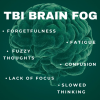Memory is the ability to acquire, store, retain, and recall information. It allows us to learn and adapt from our past experiences and helps us live our lives independently. There are three types of memory: sensory, short-term, and long-term. Each of these have different functions.
https://human-memory.net/types-of-memory/
Sensory Memory
Sensory memory is the first component of memory retrieval and consists of five senses (i.e., visual, auditory, tactile [touch], gustatory [taste], and olfactory [smell]). It allows us to process and make sense of our world. Sensory memory briefly stores information and lasts only about a second.
| Sensory Memory Type | Definition | Example |
| Visual | Attending to and processing the visual information you are seeing such as an object, word, or picture |
|
| Auditory | Attending to and processing information the information you hear |
|
| Tactile | Attending to and processing information you feel |
|
| Gustatory | Attending to and processing information you taste |
|
| Olfactory | Attending to and processing information you smell |
|
Impairments and strategies for all senses would include using other available senses.
| Impairments | Strategies |
| Visual |
|
| Auditory |
|
| Tactile |
|
| Gustatory |
|
| Olfactory |
|
Short-term Memory
Short-term memory, also known as working memory, is the second component of memory retrieval. It is information that is stored and recalled for a relatively short period of time. It allows us to hold information in our mind temporarily so it can be available to use at a later time (i.e., recalling a phone number after it has been recited).
Short-term memory usually lasts from 15 to 30 seconds and can hold about 5 to 9 items. Impairments or deficits in short-term memory can lead to:
- Asking the same questions repeatedly
- Forgetting recent events
- Inability to remember something seen, heard, or read recently
There are two strategies that an individual with an impaired short-term memory can use. They are called chunking and rehearsal.
| Strategy | Definition | Example |
| Chunking | Taking individual pieces of information and grouping them into larger pieces |
|
| Rehearsal | Repeating information over and over again so it can be processed and stored as a memory |
|
Long Term Memory
Long-term memory is the last stage of memory retrieval. It is the storage of information over an extended period of time. There are two types of long-term memory: explicit and implicit.
Explicit Memory
Explicit memory is one of the two types of long term memory. It allows you to store and consciously recall information based on facts, events, or concepts. Another term for explicit memory is called declarative memory. Explicit memory can be divided into episodic and semantic memories.
| Type of Explicit Memory | Definition | Example |
| Episodic Memory | Recalling personal events, experiences, and facts. |
|
| Semantic Memory | Recalling learned information such as general events and facts |
|
Strategies for impairments with explicit long term memory includes:
- Using a desk or phone calendar to write important events or to remember holidays
- Utilize several study strategies to learn the information (e.g., watching videos and listening videos or reading more information online)
- Connect and relate the information to previous experiences
- Find connections and make it meaningful
- Fully attend to the information you are focusing on
- Rehearse information often to help store into your long term memory
- Quiz yourself on information by using flashcards
Implicit Memory
Implicit memory is the other type of long term memory. It is not consciously recalled and allows us to perform skills, habits, and automatic behaviors, such as driving a car. There are two types of implicit memory: procedural memory and priming.
| Type of Implicit Memory | Definition | Example |
| Procedural Memory | A type of memory that allows us to store information on how to follow certain procedures |
|
| Priming | A cognitive process that occurs when exposure to something can change someone’s thoughts or behavior later |
|
Strategies that individuals with impaired implicit memories can utilize are:
- Visual aids, i.e., sequence cards of how to brush your teeth
- Breaking down a task into smaller steps
References:
https://human-memory.net/short-term-working-memory/
https://www.goodtherapy.org/blog/psychpedia/implicit-memory
Öğmen, H., & Herzog, M. H. (2016). A New Conceptualization of Human Visual
Sensory-Memory. Frontiers in psychology, 7, 830.
https://doi.org/10.3389/fpsyg.2016.00830
Healthline. (2020). Everything You Want to Know About Sensory Memory. Healthline.
https://www.healthline.com/health/mental-health/sensory-memory#types-of-sensory-me
Jawabri K.H., & Cascella, M. (2020) Physiology, explicit memory. In: StatPearls [Internet].
StatPearls Publishing. https://www.ncbi.nlm.nih.gov/books/NBK554551/



